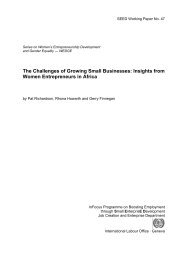manual: women workers' rights and gender equality - International ...
manual: women workers' rights and gender equality - International ...
manual: women workers' rights and gender equality - International ...
Create successful ePaper yourself
Turn your PDF publications into a flip-book with our unique Google optimized e-Paper software.
on the subject in their own work <strong>and</strong> life. For example, in a session on prevention of HIV/AIDS, the<br />
message of a HIV/AIDS infected person is 100 times stronger than any long lecture by a health<br />
expert<br />
More background information about training methods can be found in Briefing Note 1: Training<br />
Methods.<br />
1.4 Contents<br />
The package is divided into four parts:<br />
Tips for Trainers<br />
This part familiarizes trainers with successful training messages <strong>and</strong> methods in the fields of<br />
<strong>gender</strong> <strong>equality</strong> promotion, adult learning <strong>and</strong> participatory approaches. It continues with practical<br />
advice on designing <strong>and</strong> conducting training workshops <strong>and</strong> setting the scene for a good training<br />
environment on the first day.<br />
Gender Equality<br />
The second part contains four types of sessions on: self-awareness, values <strong>and</strong> attitudes, division<br />
of work, <strong>and</strong> access <strong>and</strong> control over resources. These four subjects together form the building<br />
blocks to enable the trainees to becoming advocates for <strong>gender</strong> <strong>equality</strong> promotion <strong>and</strong> finding out<br />
how to encourage <strong>women</strong> <strong>and</strong> men to create a more equal balance in the division of workload,<br />
responsibilities, resources, benefits <strong>and</strong> decision making between them.<br />
Fundamental Rights in Life <strong>and</strong> at Work<br />
This part has two kinds of sessions for use with trainees, who work in either the formal or the<br />
informal sector. The first sessions are general in nature. These address topics such as, what <strong>rights</strong><br />
do people have in life <strong>and</strong> at work, <strong>and</strong> what kinds of in<strong>equality</strong> issues often occur at work. All<br />
sessions emphasize that having <strong>rights</strong> also means having responsibilities.<br />
The general sessions are followed by sessions about specific topics. Among these you will find<br />
sessions on home work, migrant work, occupational safety <strong>and</strong> health, sexual harassment at work<br />
<strong>and</strong> maternity protection, as well as sessions which raise awareness on domestic violence, rape,<br />
child labour <strong>and</strong> the trafficking of children <strong>and</strong> <strong>women</strong>.<br />
Briefing Notes<br />
The briefing notes provide further practical <strong>and</strong> technical information for trainers to exp<strong>and</strong> their<br />
knowledge on issues ranging from training methods to <strong>gender</strong> <strong>equality</strong> promotion, the international<br />
<strong>and</strong> national human <strong>and</strong> labour <strong>rights</strong> framework, workers’ <strong>rights</strong>, health <strong>rights</strong>’ <strong>and</strong> an introduction<br />
to the ILO. The newly established dispute settlement procedures for workers in the formal private<br />
sector in Cambodia are explained to promote the use of this new tool for conflict resolution.<br />
1.5 Structure of the Sessions<br />
All sessions are structured in the following way:<br />
1. Objective<br />
2. Target group<br />
3. Material<br />
4. Exercise<br />
5. Notes for the trainer<br />
6. Related sessions <strong>and</strong> briefing notes<br />
6

















